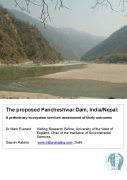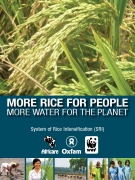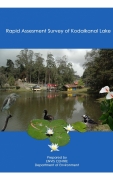/sub-categories/research-papers
Research Papers
Groundwater and well water quality in alluvial aquifer of Central Gujarat - A paper by CAREWATER
Posted on 03 Aug, 2010 08:58 PM The report by Carewater INREM Foundation deals with groundwater and well water quality in the alluvial aquifers of Central Gujarat. Gujarat has a hydrogeology representative of almost all aquifer types and depositional & formation eras. Contamination of aquifers along with scarcity of groundwater resources due to increase in water demand and reduction in recharge of groundwater from changing landuse, is a problem in Central Gujarat.
The report by Carewater INREM Foundation deals with groundwater and well water quality in the alluvial aquifers of Central Gujarat. Gujarat has a hydrogeology representative of almost all aquifer types and depositional & formation eras. Contamination of aquifers along with scarcity of groundwater resources due to increase in water demand and reduction in recharge of groundwater from changing landuse, is a problem in Central Gujarat.
Possibility of revival of dug wells in hard rock India through recharge: A discussion paper by CAREWATER
Posted on 03 Aug, 2010 08:07 PM The discussion paper by Carewater INREM Foundation on possibility of revival of dug wells in hard rock India through recharge is based on a field study across ten districts of the country. The study seeks to understand how localized governance of groundwater in hard rock areas is to be pursued through pricing (water, energy), legal regulation and community institutions. Water supply augmentation and demand management are both to be taken care of, directly through regulation or through indirect instruments such as pricing.
The discussion paper by Carewater INREM Foundation on possibility of revival of dug wells in hard rock India through recharge is based on a field study across ten districts of the country. The study seeks to understand how localized governance of groundwater in hard rock areas is to be pursued through pricing (water, energy), legal regulation and community institutions. Water supply augmentation and demand management are both to be taken care of, directly through regulation or through indirect instruments such as pricing.
Duel among duals - Popular science of basaltic hydrogeology in a village of Saurashtra - A paper by CAREWATER
Posted on 03 Aug, 2010 07:57 PM The report by Carewater INREM Foundation deals with the duel between popular science used in decision making by farmers and the formal science of hydrogeology that is based on scientific data collection. These two parallel streams of knowledge exist together, sometimes complement, and at other times are at conflict. People’s knowledge on hydrology is not ‘dying’, but thriving and growing well, refreshed continually by interfaces with science. In hard rock areas, the high hydrogeologic variability makes observation as important as theory since it is localized, pervasive and relevant to the needs of people.
The report by Carewater INREM Foundation deals with the duel between popular science used in decision making by farmers and the formal science of hydrogeology that is based on scientific data collection. These two parallel streams of knowledge exist together, sometimes complement, and at other times are at conflict. People’s knowledge on hydrology is not ‘dying’, but thriving and growing well, refreshed continually by interfaces with science. In hard rock areas, the high hydrogeologic variability makes observation as important as theory since it is localized, pervasive and relevant to the needs of people.
A preliminary ecosystem services assessment of likely outcomes of the proposed Pancheshwar dam in India/Nepal - An IES report (2010)
Posted on 02 Aug, 2010 02:24 AM This report by the IES presents the findings of a study that explores the likely impacts of the recent proposals in India to build a dam at Pancheshwar in the Himalayas on the river ecosystems and the surrounding areas and people involved. This dam will be the world's second tallest structure intended to harness hydroelectric power and water by controlling the flow of the Kali river and its tributaries.
This report by the IES presents the findings of a study that explores the likely impacts of the recent proposals in India to build a dam at Pancheshwar in the Himalayas on the river ecosystems and the surrounding areas and people involved. This dam will be the world's second tallest structure intended to harness hydroelectric power and water by controlling the flow of the Kali river and its tributaries.
The document argues that although there are many benefits of the dam in terms of energy and water, the wider ramifications of the dam and its consequences for the people staying around the area have not been thought about in the planning process. The planning process has not engaged local people in the decision-making process, there is paucity of published information and the environmental and social consequences have been considered belatedly in the planning process.
More rice for people - More water for the planet - A WWF-ICRISAT report about System of Rice Intensification
Posted on 02 Aug, 2010 02:08 AM This project report by WWF-ICRISAT begins by highlighting the importance of rice as a major source of calories for half the world’s population and also as the single largest source of employment and income for the rural population.
This project report by WWF-ICRISAT begins by highlighting the importance of rice as a major source of calories for half the world’s population and also as the single largest source of employment and income for the rural population.
It makes connections between rice production and its impact on the environment and argues for need to adopt techniques such as System of Rice Intensification (SRI) to improve produce and reduce the damage to the environment.
For example, current practices at genetic uniformity can make crops more vulnerable to pests and diseases. They are also wasteful of increasingly scarce and costly resources such as water and fossil fuels. Heavily fertilised, continuously flooded rice fields produce greenhouse gases that contribute to global warming, and misuse of inorganic fertilisers and agrochemicals results in soil and water pollution. Evidence indicates that there has been a gradual slowdown in the yield gains of rice in many countries.
Rapid assessment survey of Kodaikanal lake - ENVIS Centre (TN) (2009)
Posted on 02 Aug, 2010 02:02 AM This document by the Department of Environment, Government of Tamil Nadu highlights the importance of the Kodaikanal lake as an important tourist destination and warns that this freshwater lake is under the threat of getting polluted and its biodiversity endangered.
This document by the Department of Environment, Government of Tamil Nadu highlights the importance of the Kodaikanal lake as an important tourist destination and warns that this freshwater lake is under the threat of getting polluted and its biodiversity endangered.
The document presents the findings of the study that aimed at assessing the physico-chemical and biological quality of the Kodaikanal lake.
Evidence indicates that unrestricted tourism activities have led to high use of plastic bottles, glass bottles, plastic bags, causing high levels of pollution and silting of the lake. Damaged fibreglass boats left inside the lakes also pose a serious threat to the lake ecosystem.
National Rural Drinking Water Programme - Framework for implementation - MoRD (2010)
Posted on 02 Aug, 2010 01:46 AMThe Government of India launched the Accelerated Rural Water Supply Programme (ARWSP) in 1972-73 to ensure provision of adequate drinking water supply to the rural community through the Public Health Engineering System.
The second generation programme started with the launching of Technology Mission in 1986-87, renamed in 1991-92 as Rajiv Gandhi National Drinking Water Mission. Stress on water quality, appropriate technology intervention, human resource development support and other related activities were introduced in the rural water supply sector.
The third generation programme started in 1999-2000 when sector reform projects evolved to involve community in planning, implementation and management of drinking water related schemes, later scaled up as Swajaldhara in 2002.
The Rural Water Supply (RWS) sector has now entered the fourth phase with major emphasis on ensuring sustainability of water availability in terms of potability, adequacy, convenience, affordability and equity while also adopting decentralized approach involving PRIs and community organizations.
Decentralisation and water resources management in the Indian Himalayas: The contribution of new institutional theories - Conservation and Society paper
Posted on 02 Aug, 2010 01:31 AMThis paper discusses the relevance of the process of decentralisation in water resources management. The paper argues that decentralisation is not about formulating a top-down reform package to transfer power from central government to other actors to manage water resources, nor is it about emphasising the existence of the bottom up agency.
Rather, the paper draws on "New Institutionalism" and argues that decentralisation is a complex adaptive process that involves natural as well as political actions of actors and agents who draw on existing structures to negotiate and renegotiate the existing unequal power relations to manage water.
Salvaging and scapegoating: Slum evictions on Chennai’s waterways - EPW paper
Posted on 02 Aug, 2010 01:03 AMThe paper highlights the case of recent projects that have been planned on the river Cooum in Chennai.
K-East Ward Mumbai Water Distribution Improvement Project (WDIP): FAQs compiled by CASUMM
Posted on 01 Aug, 2010 03:58 PMThis document by Collaborative for the Advancement of the Study of Urbanism through Mixed Media (CASUMM) provides details about the K-East Water Distribution Improvement Project (WDIP) started in Mumbai, in the form of FAQs.
It argues that the very way in which the project is being planned and implemented, indicates that the agenda of the donor organisations is to gradually push for the privatisation in the water sector.